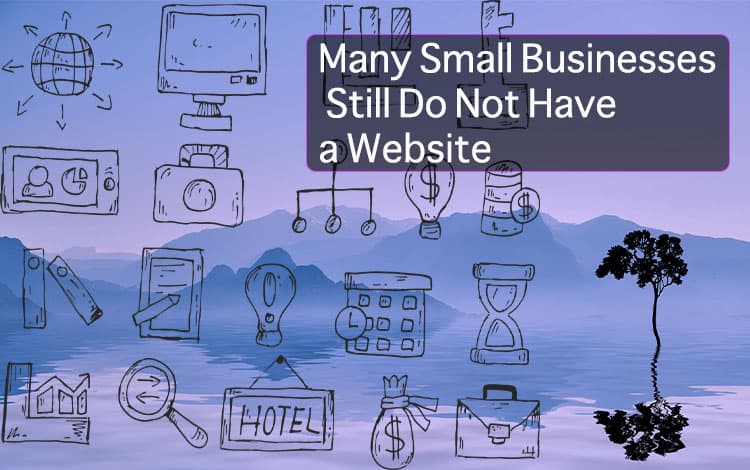Old school ways aren't obsolete. Word of mouth is still critical to small businesses. There is a time and a place for more traditional advertising approaches. However, today having a digital presence via a website to back it up is essential. And yet, according to a recent CNBC survey, an amazing 45% of small business owners claimed not to have a website. And of those who did, roughly 35% took advantage of their online presence when it came to communicating with and updating their client base.
Many, according to experts, are simply afraid of technology. They're unsure how it works, they have no clue as to how to approach it and so rather than forge ahead with a website, they just ignore it altogether. You also have generational issues with some companies. Older entrepreneurs are determined to continue doing things the "tried and true" way, such that has been working for them all along.
And yet, with how easy and cost-effective it's become to launch a website for your business, it doesn't make sense not to have one. Domain names now cost a fraction of what they once did. Even if you don't hire a professional web development company, you can still create your basic website for a few hundred dollars, if that. Your website is your business card—that's how you need to think about it. And without a business card, you could stand to lose customers who otherwise are not aware that your company even exists.
Websites Are Cost-Effective
With the emergence of platforms like Wix and Squarespace, companies no longer need to shell out thousands for a site. The DIY sites that you can create, while admittedly more basic, are still quite good—and becoming increasingly popular. Many small businesses, finding it hard to justify spending 8k on a new site, do go through channels such as Weebly for instance to build their sites.
Given the rise in DIY site popularity, web developers are starting to come down in terms of their pricing to remain competitive. A recent SBA survey estimated that there are roughly 28 million small businesses active—and around one-half of those businesses currently have DIY generated websites.
There are now even companies out there who specialize in helping smaller businesses take advantage of DIY site platforms. While a DIY site is far easier to build, there is still something of a learning curve involved and so here is an area in which more and more consultants are offering support.
What About Return on Investment?
One industry that's been heavily impacted by the digital revolution is that of auto dealers. Since the 1990s the auto dealership business has been rapidly evolving. Digital marketing for them has become a must. Referrals alone will no longer cut it. The dealership has to have online inventory for customers to look through and for which they will ultimately shop. Regardless of how long they've been in business or how established their brand, without a dynamic website, they will more than likely not survive.
Many auto dealer owners lament the loss of loyalty. But they are steadily realizing that the trend is online shopping, finding the car you want at the right price--even if it means visiting a dealership that is not necessarily local to you. As a result, many dealerships are spending upwards of 75% of their marketing budget on digital efforts. And many, are discovering that indeed by investing in digital marketing their return on investment is quite a bit higher than they see when paying for TV or radio spots for instance. Beyond a comprehensive site, dealerships are also taking to Facebook and Instagram for advertising; social media, especially for some industries, are becoming just as important as a website.
Small business marketing strategies
Ask most car dealers and they will tell you that you need a website. Particularly with high dollar items such as automobiles, customers having the ability to browse and shop around on your site is paramount. But even for those who sell smaller items or offer services, having a website is the only way to grow your business.
Everyone from 18 to 80 has a smartphone today. They go to their phones first for everything. If they're looking for a place to eat, for example, before patronizing a restaurant they'll go to the site and look at reviews. Perhaps they want to visit a particular salon—they'll more than likely visit the site first to check out services and rates. According to most digital marketing experts, the top ten percent of businesses have gone at digital marketing full throttle.
Some business owners have tried skirting around a website by using such things as Yellow Pages online. This, however, can often lead to potential customers growing frustrated with not being able to find a corresponding site. Other businesses try using a Facebook page instead of a site—again though, you have people trying to link to your site from your FB page and when they ultimately cannot find one, they're likely to dismiss you and move on to the next business.
According to another CNBC survey, 55 percent of small-business owners did say that they had a website site. 50% said they had a Facebook page and only 20% claimed to have a Twitter account. If you ask most digital marketers, they'll tell you that for a small business, multiple solutions by way of multiple channels is going to be your best bet in terms of getting those customers and growing your business. You start with a website and build out from there.
If your business is in need of funding for a website or implementing a marketing strategy, First Union is here. Call today to speak to one of our agents!
